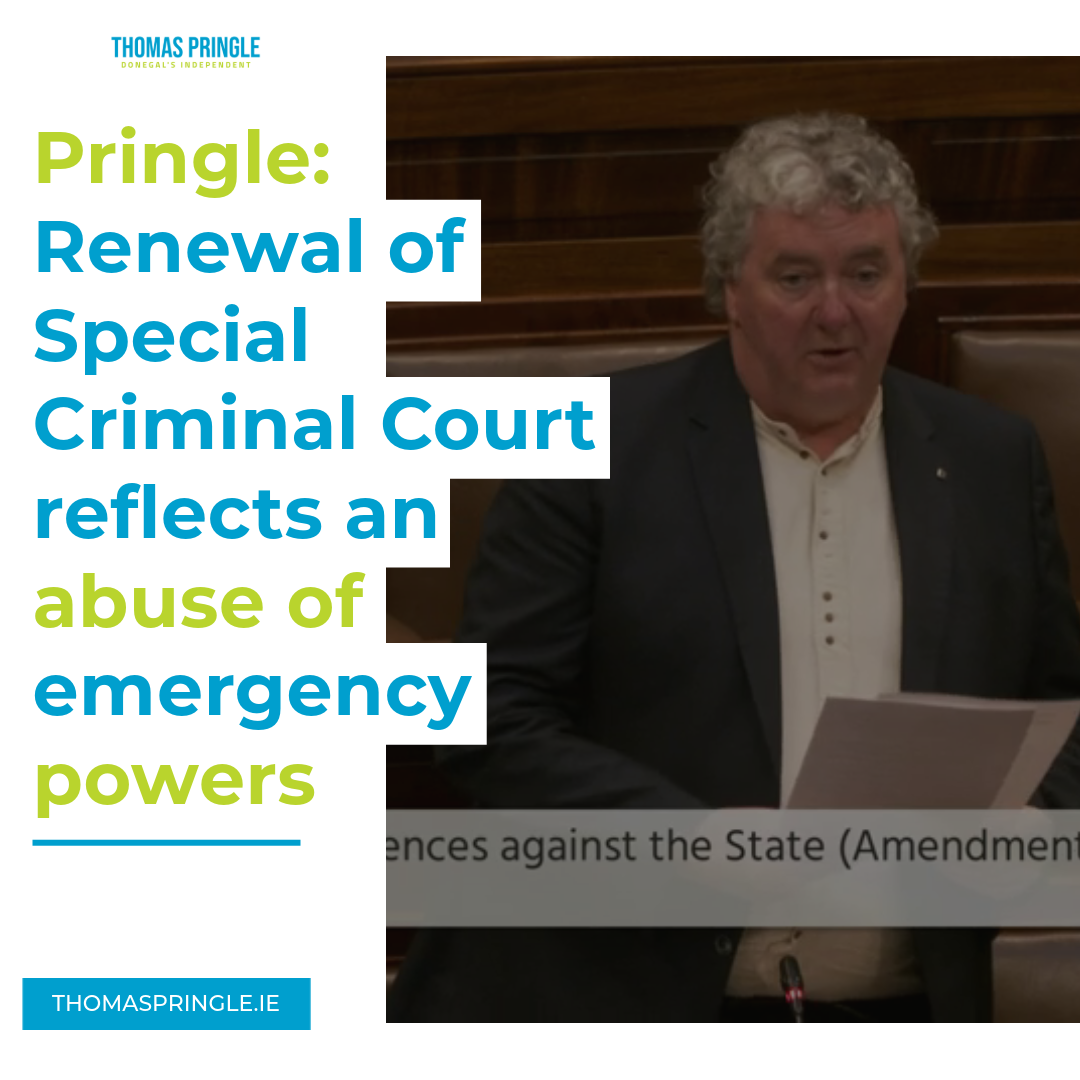- Pringle: We need a policy that recognises the importance of inshore fishing
- Pringle: Disabled people and carers face crisis of State neglect
- Pringle: Failed FF/FG housing policies forcing people to put their lives on hold
- Pringle welcomes Donegal council motion on Occupied Territories Bill: ‘We cannot stand by in the face of genocide’
Pringle: Renewal of Special Criminal Court reflects an abuse of emergency powers
- Updated: 26th June 2024

Independent TD for Donegal, Thomas Pringle, said renewal of the Special Criminal Court reflects an abuse of emergency powers and raises grave human rights concerns.
Addressing the Dáil on Tuesday, Deputy Pringle said: “I have stated many times previously that I think it is absolutely farcical that we are forced to debate and extend these Acts year after year.
“It undermines the House and it undermines our justice system to keep working off emergency legislation on a permanent basis. This rubber-stamping exercise is just one of the many undemocratic practices that this government insists on continuously engaging in.
“I have been appalled by the blatant disregard for the legislative process that this government has shown time and time again, often for extremely important legislation being introduced in this country, as well as the constant undermining of the Oireachtas. The yearly extension of these Acts is just one example of this,” he said.
The deputy was speaking on Motion re Renewal of Offences Against the State (Amendment) Act 1998 and Section 8 of the Criminal Justice (Amendment) Act 2009.
Deputy Pringle said: “The current version of the Special Criminal Court was introduced in 1972 as an emergency response to the Troubles. However. this court has been in continuous operation ever since. It has been 52 years since its so-called ‘temporary’ introduction and here we are looking to extend its operation yet again.
“The renewal of the Special Criminal Court not only reflects an abuse of emergency powers, it also raises grave human rights concerns,” he said.
The deputy said the Independent Review Group’s report on the Offences Against the State Acts, published by the Minister for Justice last June, was unanimous in recommending repeal of the Acts.
Deputy Pringle said: “I would like to note, however, the Minority Report’s reluctance to recommend the establishment of a permanent or standing non-jury court and their belief that the recommendations contained in the Majority Report are not supported by ‘adequate empirical evidence or sufficiently extensive comparative analysis’.
“It is clear that the Independent Review Group faced a significant data deficit when conducting their research. The Minority Report highlighted many challenges faced by the Review Group, such as ‘the impossibility of researching or interrogating assertions made by some stakeholders, especially those assertions that were not supported by testable data or empirical evidence’ and I would like to echo the Minority Report’s concerns that a review group appointed by the Minister for Justice could not be facilitated sufficiently by the relevant agencies. That’s very worrying.
“It calls into question the findings of the Independent Review Group, as it is clear that they were not given the necessary and relevant information required to make such important recommendations. The inability to access reliable and verifiable information when reviewing such important legislation as this is wholly unacceptable,” he said.
The deputy said: “It is clear, given the lack of reliable and transparent information and without questioning the good faith of any stakeholders, that this report is flawed and that definitive recommendations cannot be made.
“What’s more, it is concerning that the Minister was either unable to access important information or unable to facilitate a transparent review. And I would ask that the Minister consider this and to introduce measures to protect jurors instead of resorting to an emergency court,” he said.



